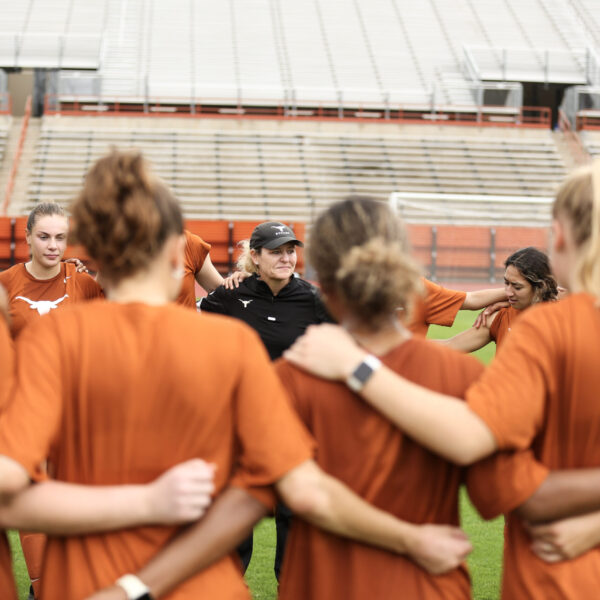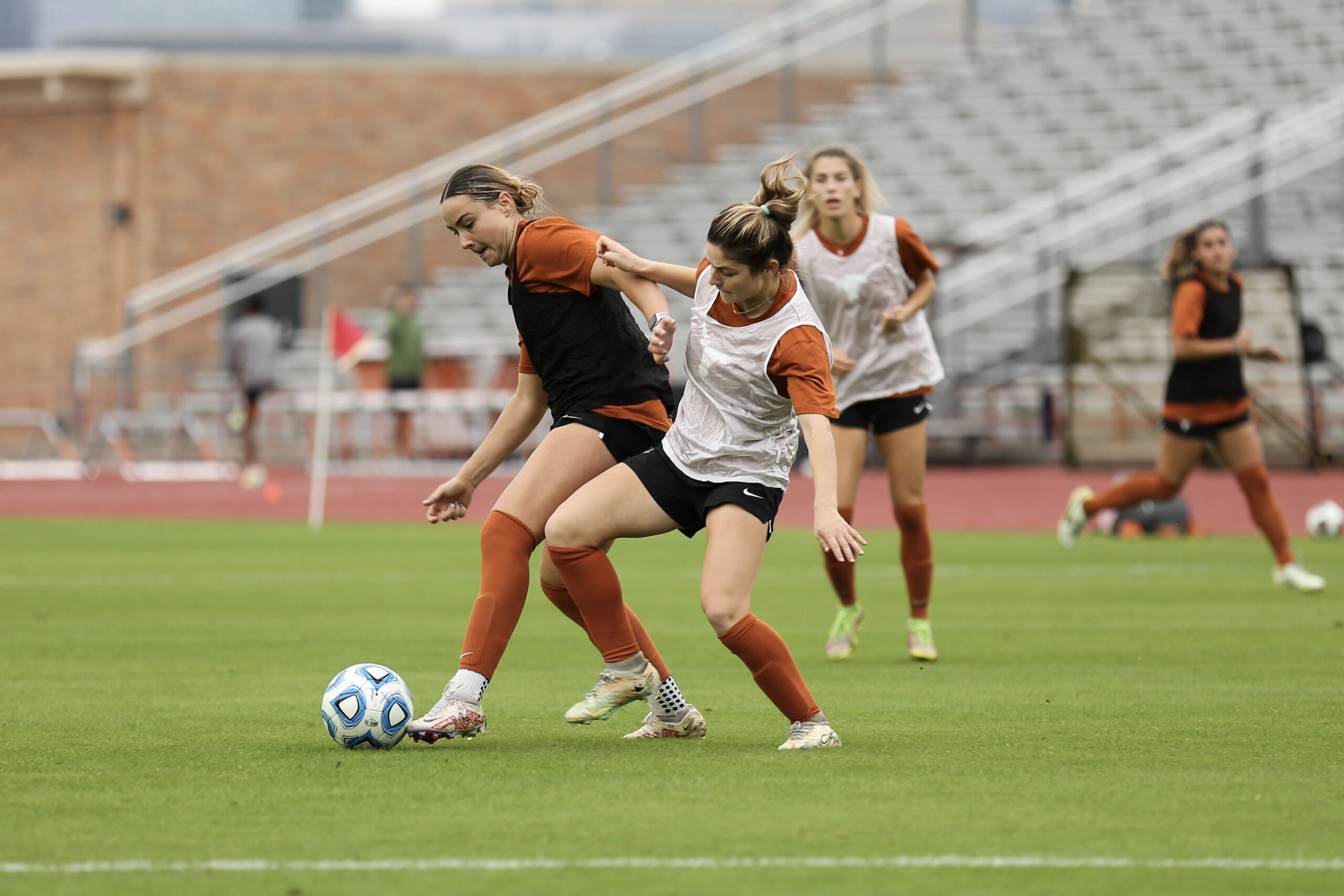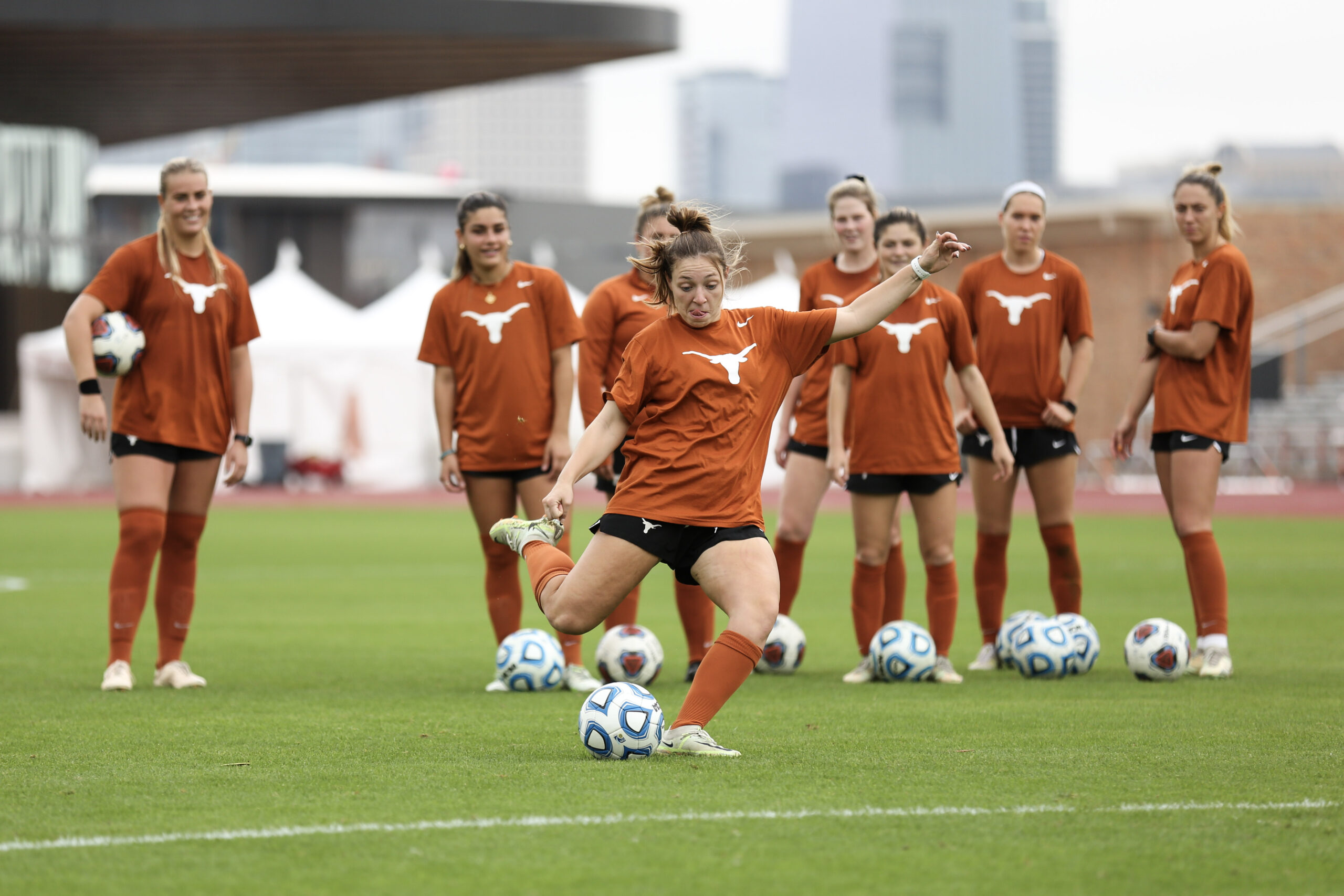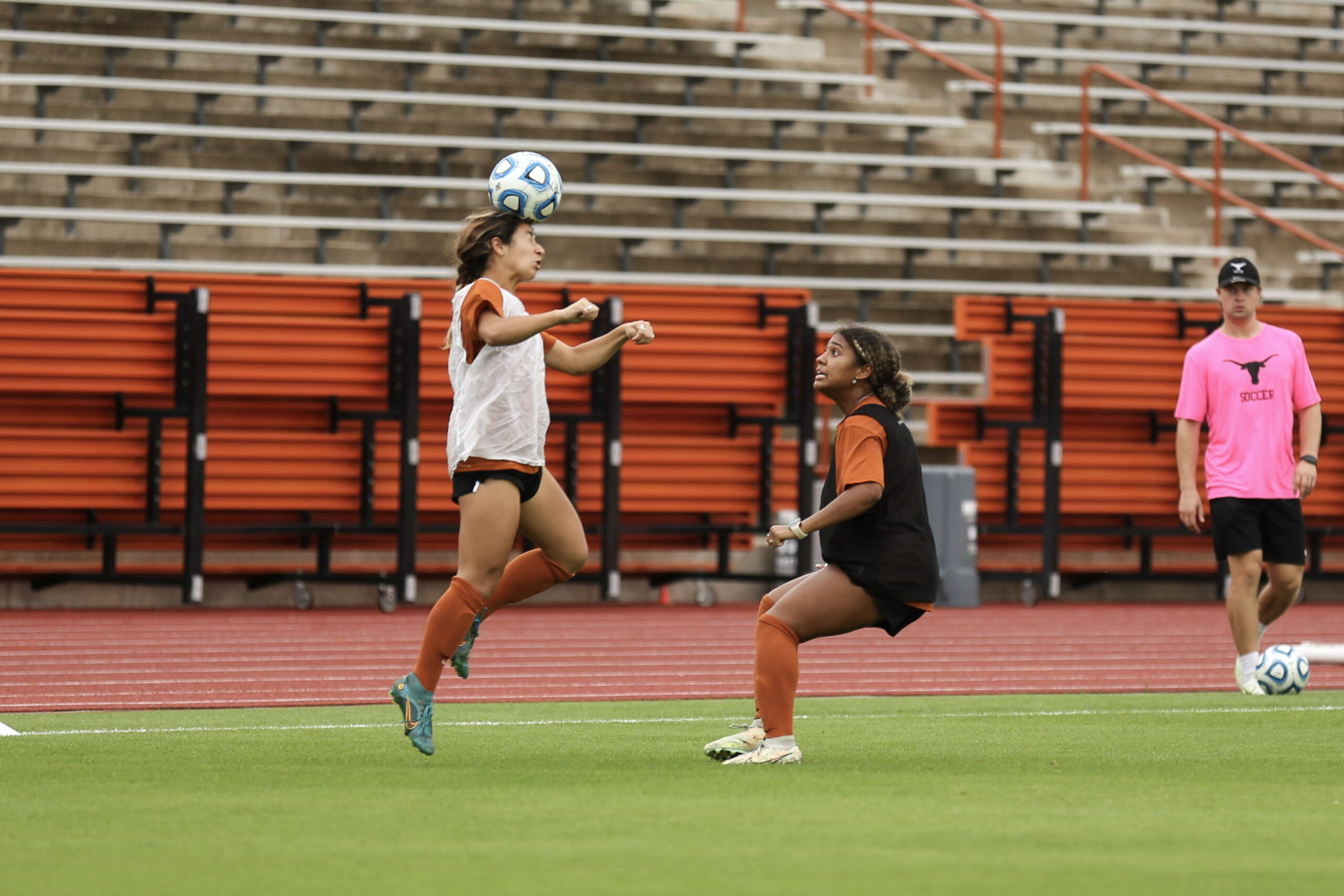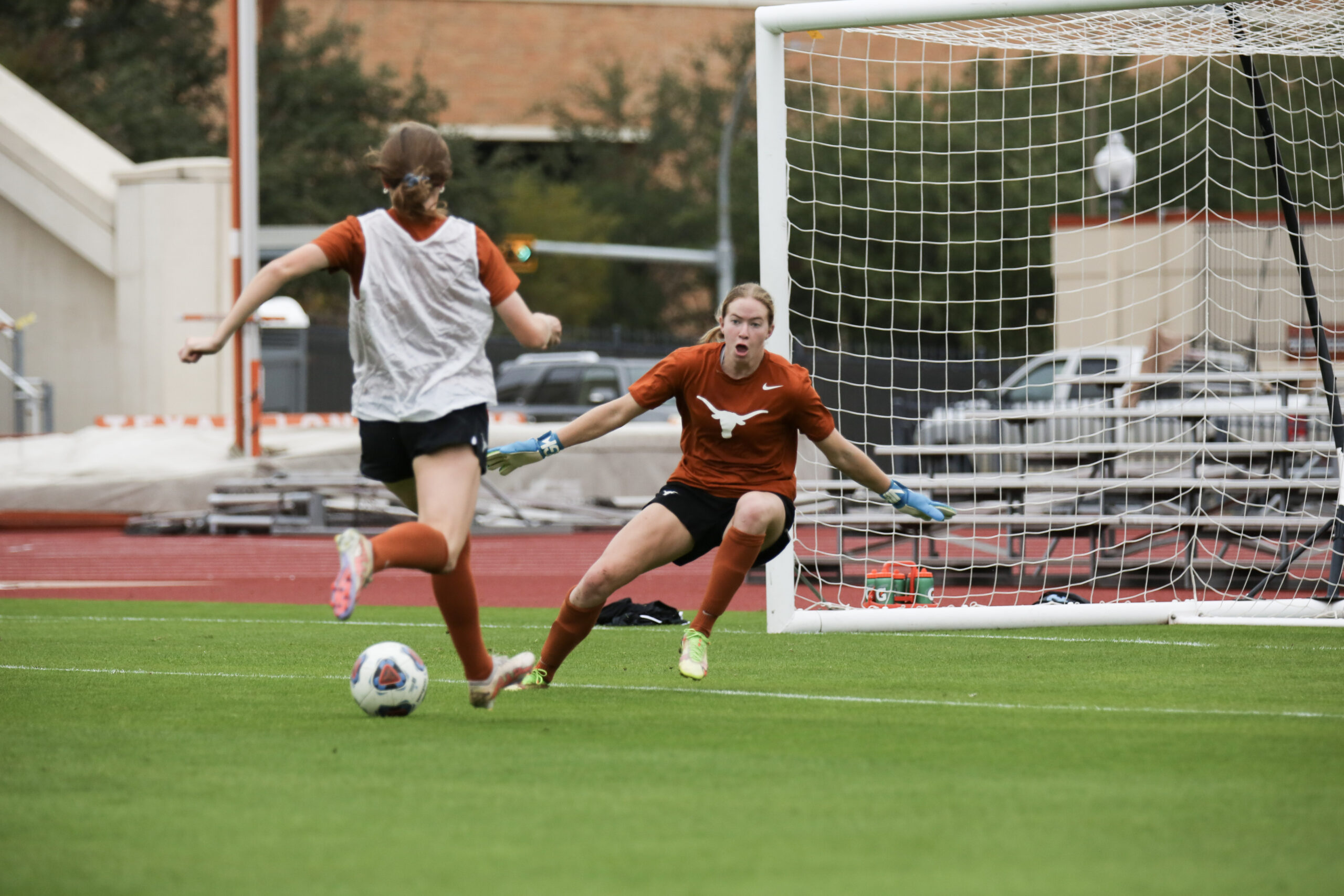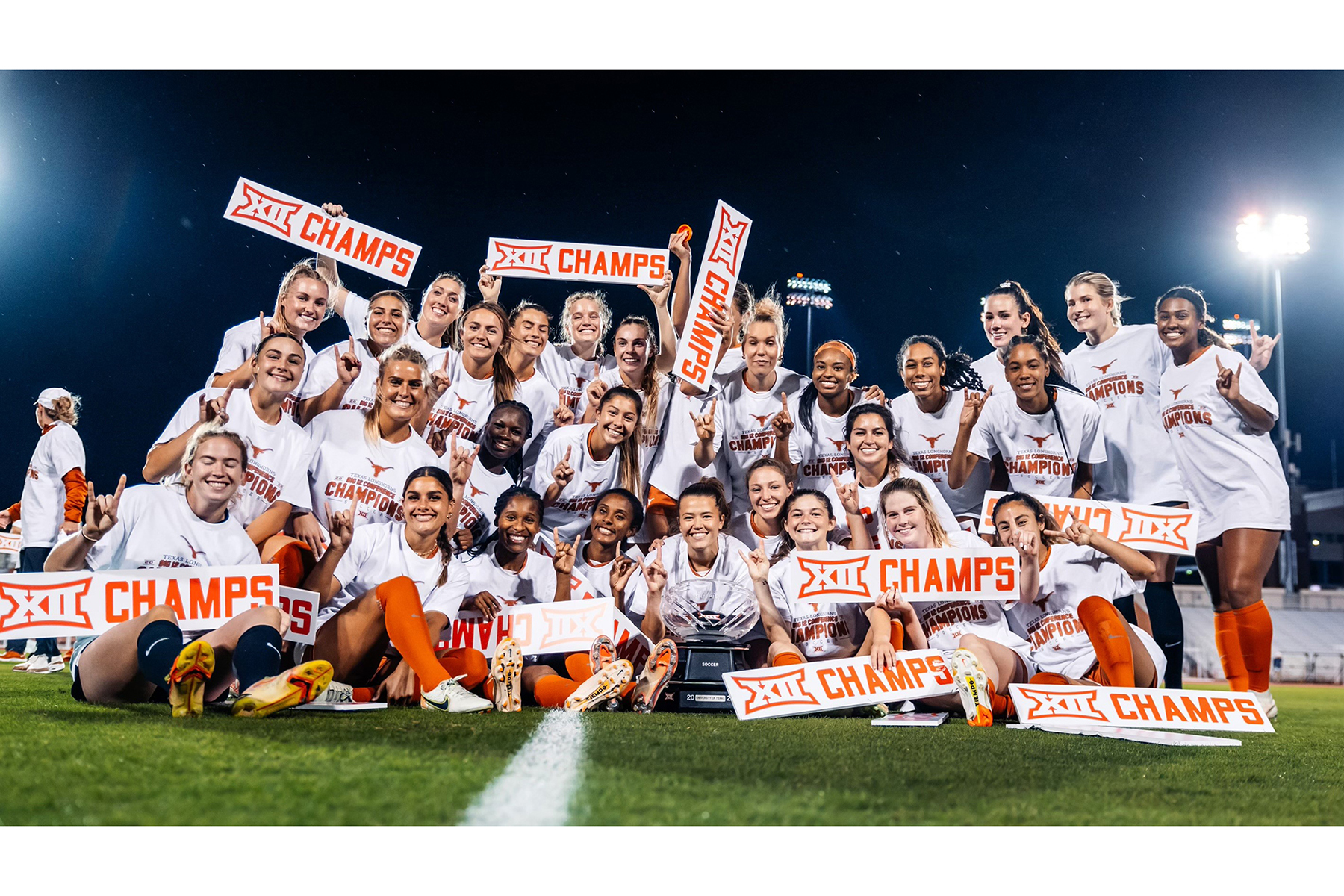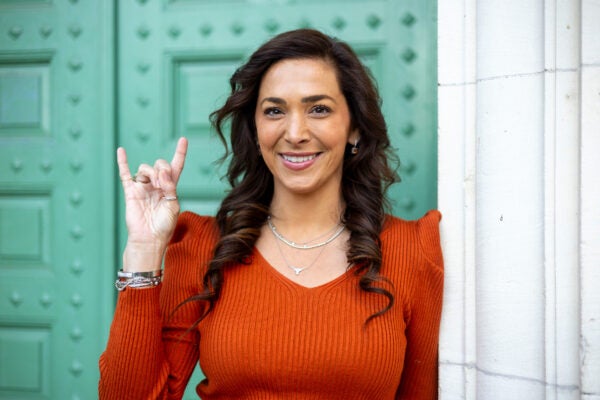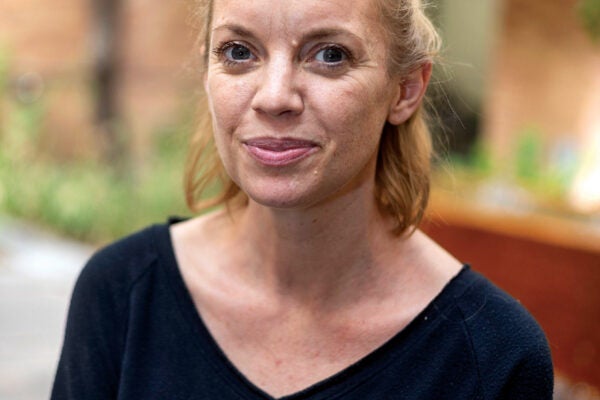On a damp, cloudy Tuesday in October, the Texas soccer team begins its warmup with a lap around the Mike A. Myers Track and Soccer Stadium. The towering floodlights brighten the dark day; the field and stands feel grand and insulated from the noise of Interstate 35. While the girls run, head coach Angela Kelly launches practice shots into a small mesh goal set up for the first drill. After the warmup, the players stroll into the boundary lines of the pitch, ready to hone their dribbles, kicks, headers, assists and goals. Junior defender Lauren Lapomarda approaches Kelly and gives her a big hug. They exchange a jovial conversation before Kelly sends her off to the starting position for the drill.
Since she joined UT soccer in 2011, Kelly has poured herself into the dynamic, powerhouse soccer team, guiding the young women through multiple semifinals and inching them closer to the league championship each year. When she’s not planning offensive and defensive plays or casually scoring her own goals during practice, she’s on the road with the players, moving from one game to the next while setting records and raising the bar for Texas soccer. Last year, UT women’s soccer was almost the champion of the Big 12 conference — a title the team has not won since 2007. In the 2022 season, the team made it to the Big 12 championship semifinals and the second round of the NCAA championship.
You develop strong young women by giving them the best education and making them the best players they can be.
“It’s not about winning. (Taking home) championships are a byproduct of what you do every day,” Kelly says. “You develop strong young women by giving them the best education and making them the best players they can be. That’s my goal, right? … Bar winning another game, we won six, we tied three, we were undefeated in the league.”
The second drill was a scrimmage. Kelly assigned each group to the offensive or defensive strategies that they had discussed. In the mock game, they apply Kelly’s guidance to the plays. During the hard-fought drill, Lapomarda maneuvered around the defense and landed a shot to the back of the net. She ran across the field to Kelly, arms raised in celebration — Kelly mirrored Lapomarda.
“I just love to see them (own it). Whatever their ambitions are, I love to be a factor in them having that success,” Kelly says.
Before she became a coach, Kelly believed her future in the sport was to play professional soccer.
At the University of North Carolina, soccer coaching legend Anson Dorrance chose Kelly as his assistant coach, planting the seed for where she is today. While she enjoyed her role and excelled, she kept her sights on the major leagues. After years as a collegiate athlete and assistant coach, she played on the Canadian national team and represented Canada in the 1995 Women’s World Cup hosted in Sweden. Her performance there earned her an induction into the Canada Soccer Hall of Fame.
“I’m grateful for all my experiences on the Canadian national team. It was really exciting for them to recognize me as a top player and a pioneer of the women’s game. It was humbling. It was an honor,” Kelly says.
Kelly and Dorrance stayed in touch over the years. Then, in 1996, while Kelly was still playing professional soccer in the U.S. and Canada, Dorrance persuaded her to take another shot at assistant coaching — this time at the University of Tennessee.
As Tennessee’s assistant soccer coach in the late ‘90s, Kelly met former women’s basketball coach Pat Summitt. She took Kelly under her wing while coaching the Tennessee Lady Volunteers basketball team and reaffirmed that coaching was Kelly’s true calling. Beginning in 2000, Summitt’s mentorship shaped her teaching style. Kelly then earned the head coach position at Tennessee.
When she became the leader of Lady Volunteers soccer, the program was in its infancy. They had never advanced to the NCAA Tournament nor won a Southeastern Conference Tournament. Kelly’s arrival as head coach signaled a new start for the team. Throughout 12 seasons, the team’s record flipped. It won three SEC regular-season titles, four consecutive SEC Eastern Division crowns and four SEC Tournament titles.
“I think every year is a building block, right? And as a young coach — I started at 26 — and I just was a sponge to everything I saw daily,” Kelly says.
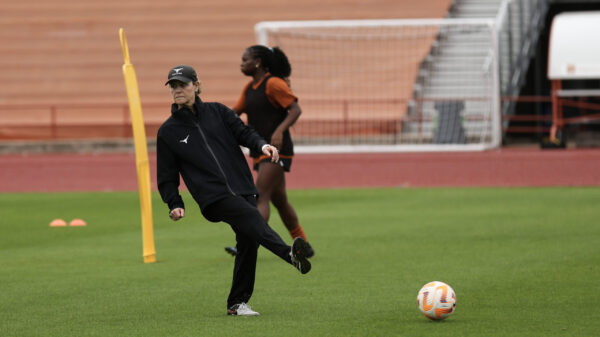
In December 2011, Kelly left Tennessee to join the Longhorns’ women’s soccer team. In her 11 years at UT, she has led the team back to a Big 12 championship final match, in addition to four semifinal appearances and five showings at the NCAA Tournament. In 2017, Texas soccer appeared in the NCAA Sweet 16 for the first time in 10 years.
“It’s been a great challenge and something I’ve invested a lot of time in. But certainly, the most empowering moment of every day is seeing all of these young people be successful,” Kelly says.
Although her life is devoted to soccer, the sport has evolved from an ambition of personal glory to a vessel for community and working with students. She finds fulfillment in witnessing young women empower themselves through athletics and state-of-the-art education. For Kelly, the lessons of coaching extend beyond the field as she guides her players to discover their best selves as strong, independent women, which incidentally makes them great athletes.
Through athletics and education, Kelly’s training tactics put the team into problem-solving scenarios. Occasional failures are key teaching opportunities — if the first strategy doesn’t work, the answer is always to try again. “That’s what life is all about,” Kelly says.
As the day’s practice draws to a close, the players and coaches gather in a circle under the overcast Austin sky. Everyone wraps their arms around the shoulders of the person next to them. They make a chain and drop their heads inward.
The first closing statements include affirmations and praises of fellow teammates. The girls applaud Lapomarda’s goal and echo chants and elated cheers. Finally, they end practice with an acknowledgment to one player balancing on her crutches. They turn their attention to her and thank her for continuing to show up and support her teammates at every practice.
“I think the most successful people are not always the most talented,” Kelly says. “It’s typically people of perseverance and resilience. So continue to be the best version of yourself that you can be every day — and that’s all I try to do and teach.”
